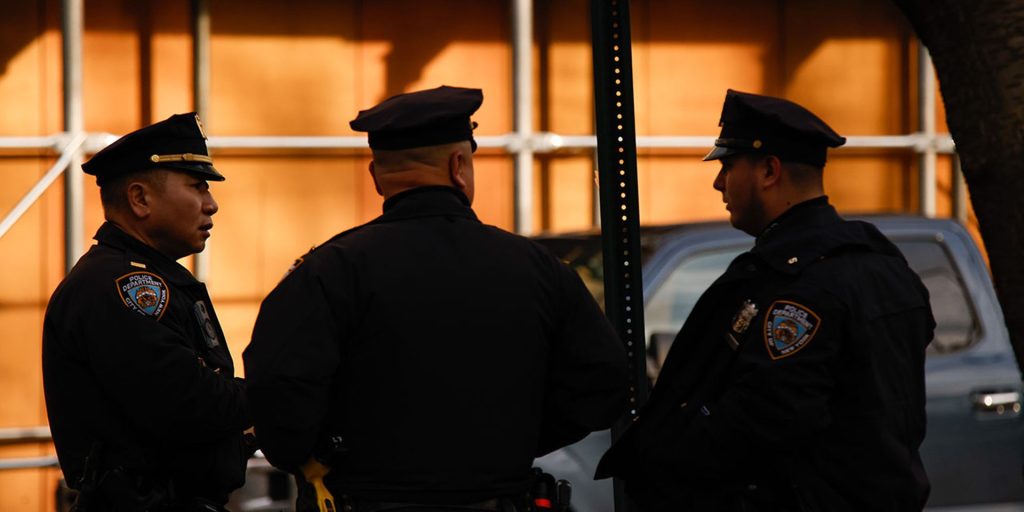Notable Alumni
It’s a great time to be a Rutgers–Newark School of Criminal Justice graduate. No matter where you live, no matter where you are in life—just beginning your career or just beginning your retirement—our alumni have more opportunities than ever to stay connected to Rutgers and each other. This network means being part of an ever-growing network of achievers who care about their communities and their campus. Connect with the Rutgers University Alumni Association.
Here you will find news about the work of our alumni, ranging from publications and press releases, to awards they’ve been given and programs they’ve developed. Together, we are driven by a passionate concern about problems of crime, public security, inequality, and social justice and aim to apply our knowledge and scholarship to address these challenges. Our interests are as diverse as our backgrounds, our training, and the local environment within which we work.
Dr. Janet Garcia-Hallett Named Recipient of Martin Luther King, Jr. 2026 Vision Award

Janet Garcia-Hallett
SCJ Class of ’17
Dr. Janet Garcia-Hallett is set to be recognized with the University of New Haven Vision Award at the 2026 Martin Luther King, Jr. celebration. This prestigious honor recognizes individuals who have made a significant and innovative impact on the lives of others.
Garcia-Hallett is currently an Associate Professor of Criminal Justice at the University of New Haven. She earned her Ph.D. in Criminal Justice from the Rutgers University School of Criminal Justice. Her research is primarily focused on the detrimental impact of incarceration on communities of color and the intersectional obstacles women of color face before, during, and after incarceration. Her book, Invisible Mothers, explores how mothers of color navigate motherhood post-incarceration, and how their reentry into the community is shaped by mothers’ treatment and experiences at the intersection of gender, motherhood, racial-ethnic background, and criminal record. In doing so, her book examines the concept of visibility in how social institutions treat mothers of color as invisible mothers restricted from equal opportunities, but also simultaneously as visible (m)others who are criminalized and penalized for surviving their circumstances. Garcia-Hallett’s scholarship can be found in The Prison Journal, Feminist Criminology, Sociology Compass, and the International Journal of Offender Therapy and Comparative Criminology.
Dr. Jennifer Lanterman Wins ASUN Service-Learning Faculty Award

Jennifer Lanterman
SCJ Class of ’07
Dr. Jennifer Lanterman is this year’s recipient of the ASUN Service-Learning Faculty Award for her work with Inside-Out Prison Exchange Program, the first program of its kind in Nevada.
Dr. Lanterman uses innovative teaching methods to lead the program at the Washoe County Detention Facility, where college students and incarcerated individuals learn together about the justice system. This program fosters mutual understanding and challenges participants to reflect on their own biases and perceptions.
Additionally, she has collaborated with the Washoe County Sheriff’s Office on a study examining the effectiveness of virtual programming for reducing recidivism among young adults and transgender inmates. This research aims to enhance access to rehabilitative education for individuals who face barriers to participation in traditional in-person programs.
Dr. Lanterman is an Associate Professor of Criminal Justice and the Director of the School of Social Research and Justice Studies at the University of Nevada, Reno. Her research focuses on the institutional and community-based management and treatment of high-risk and high-need offenders, with a particular emphasis on implementing evidence-based practices in correctional environments. She collaborates with legal system practitioners and behavioral healthcare providers to develop, implement, and evaluate programs aimed at improving justice outcomes.
For more information about Dr. Lanterman’s work and publications, you can visit her University of Nevada, Reno profile.
Dr. Melinda Arnold to be Recommended as Next Chancellor at University of Tennessee Southern
Melinda Schlager Arnold
SCJ Class of ’05

KNOXVILLE, Tenn. — Dr. Melinda Arnold, special assistant to the president at Texas A&M University–Texarkana, will be recommended by University of Tennessee System President Randy Boyd to serve as the next chancellor of the University of Tennessee Southern.
The UT Board of Trustees will consider Boyd’s recommendation at a special meeting to be held in the coming weeks . Pending board approval, Arnold’s first day as chancellor will be July 1.
“One of the most important responsibilities I have as president is hiring outstanding people to lead our campuses and institutes,” Boyd said. “Dr. Arnold is the right person at the right time to lead UT Southern. She brings energy, experience, and a deep commitment to student success. I’m confident she will be a transformative leader for the campus.”
A proven higher education leader with more than two decades of experience, Arnold has served in a variety of academic leadership roles focused on expanding access, launching high-demand academic programs and driving enrollment growth. At Texas A&M University–Texarkana, she previously held the role of provost and senior vice president for Academic Affairs, where her leadership led to record enrollment gains, enhanced student support services and millions in external funding. She also served as provost at Montana State University Billings and held academic roles at the University of North Texas at Dallas and East Texas A&M University. Her background also includes leadership positions in criminal justice organizations and extensive experience with grant writing and policy development.
Arnold holds a doctorate and master’s in criminal justice from Rutgers University, a master’s in liberal studies from Northwestern University, and a bachelor’s in philosophy from the University of Texas at Austin. She is also a graduate of the Harvard Graduate School of Education’s Institute for Educational Management.
The UT Southern chancellor serves as the chief executive officer of the campus, reporting directly to the UT System president, and is a member of the UT System leadership team. The chancellor is responsible for promoting academic excellence, overseeing strategic initiatives and leading efforts related to student success, fiscal stewardship, community engagement, and institutional growth.
Source – UT System News.
Policing as Public Health
Why Broken Windows still applies

Anthony A. Braga
City Journal, Winter 2025
Twenty-first-century policymakers profess a deep commitment to “public health,” and they now apply the concept to the problem of violent crime in cities. When Joe Biden took office as president in 2021, for example, he promoted the adoption of public-health interventions to address an uptick of murders; last June, U.S. Surgeon General Vivek Murthy declared gun violence a public-health crisis.
These initiatives may be well-intentioned, but they ignore a hard truth. Police departments play a critical role in controlling violent crime and should be part of the public-health approach. Advocates of such an approach to crime tend to be reluctant to engage the police, worried about racially disparate policing and incarceration statistics. Yet the wholesale avoidance of the police works against their goals.
Read the full article.

Anthony Braga
SCJ Class of ’97
Anthony A. Braga is the Jerry Lee Professor of Criminology and the Director of the Crime and Justice Policy Lab in the Department of Criminology at the University of Pennsylvania. He collaborates with criminal justice, social service, and community-based organizations to produce high impact scholarship, randomized field experiments, and policy advice on the prevention of crime at problem places, the control of gang violence, and reductions in access to firearms by criminals. With colleagues, Braga has published numerous peer reviewed journal articles in top criminology and criminal justice journals such as Criminology, Journal of Research in Crime and Delinquency, Justice Quarterly, and the Journal of Quantitative Criminology; top medical and public health journals such as the Journal of the American Medical Association, New England Journal of Medicine, and the American Journal of Public Health; and top sociology journals such as American Sociological Review, American Journal of Sociology, and the Annual Review of Sociology. Braga has authored four books and edited nine volumes with top scholarly presses such as the National Academies Press, Oxford University Press, and Cambridge University Press.
Braga has served as principal investigator or co-principal investigator on projects totaling more than $22 million in external funding from a variety of federal, state, and private grant-making institutions including the U.S. National Institute of Justice, National Institutes of Health, National Science Foundation, and Arnold Ventures. He has served on four National Research Council committees, mostly recently serving on the Committee on Proactive Policing – Effects on Crime, Communities, and Civil Liberties. Braga is a fellow of the American Society of Criminology (ASC) and the 2021 recipient of its August Vollmer Award recognizing his contributions to crime prevention policy and practice. He is also a past president and fellow of the Academy of Experimental Criminology (AEC), and the 2014 recipient of its Joan McCord Award recognizing his commitment to randomized controlled experiments.
The practical value of his work in violence reduction in disadvantaged neighborhoods has been recognized by numerous awards, including the Civic Leadership Award (2004) presented by The Boston Foundation, the United States Attorney General’s Award for Outstanding Contributions to Community Partnerships for Public Safety (2009), and the U.S. Department of Justice Project Safe Neighborhoods Research Partner of the Year Award (2010). Between 2007 and 2013, Braga served as Chief Policy Advisor to former Boston Police Commissioner Edward F. Davis and worked with his command staff and line-level officers on award-winning community policing and crime prevention initiatives. Braga holds an M.P.A. from Harvard University, and a Ph.D. in criminal justice from Rutgers University.

